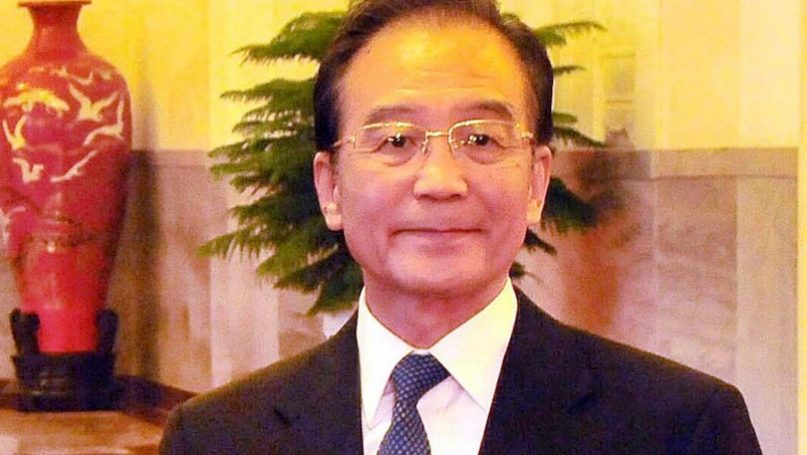Klaus Heinrich Raditio

In April 2021, Wen Jiabao, who served as the Chinese Premier from 2003–2013 published an essay titled ‘My Mother’ as a tribute to his mother who had recently passed away. The essay took Chinese social media by storm before it got censored to prevent netizens from disseminating it. Another interesting fact is that it was published in Macao Herald which suggests that no mainland’s media was willing to publish it due to the sensitivity of the content. If read in its entirety, the essay conveys certain nuances that are worth pondering, particularly if one puts them in the context of Chinese political climate under current President, Xi Jinping.
Wen begins with the depiction of his parents’ humble background. They are the representation of Chinese people’s struggle in dealing with social and political upheavals from the Japanese invasion, the Chinese civil war, and the Cultural Revolution. Wen wrote that his father, who was a teacher, suffered mental and physical torture during the Cultural Revolution – a subject that might be considered sensitive to the Communist Party. Unlike Xi, Wen is not a princeling – a designation for the children of first-generation communist veterans. Wen forged his political career through the Communist Youth League (tuanpai).
Wen was reputed to be the first among the country’s top officials who arrived early in disaster-stricken areas, as shown in the 2008 Wenchuan earthquake and the 2010 Gansu landslide. The portrayal of Wen as a pro-people leader might send a message to the current leadership to listen to the voice of the grass roots, especially when the space for dissent is limited while the party’s grip over the society has tightened in recent years. Beijing’s censorship of Wen’s article, for instance, demonstrates the gravity of this modern-day suppression. Even a former VIP figure in the Party leadership is not excluded from Xi’s control.
Secondly, the time of its publication cannot be more perfect. Though the essay was published in the context of Qingming Festival on 4 April 2021 (The day to commemorate the deceased), the online version was published in four stages. The first, second and third parts were published on 25 March, 1 and 9 April respectively. The fourth part, which includes the sensitive content was published on 15 April. In the last part of the essay Wen wrote his closing statement:
In my mind China should be a country full of fairness and justice where there should always be respect for the will of the people, humanity and the nature of human beings. There should always be youthfulness, freedom and a striving spirit. I spoke them out loud and fought for them. This is what the life taught me as the truth, also what my mother handed down to me.
Notably, 15 April is also the date of Hu Yaobang’s death in 1989. Among the Chinese public, the subtlety of the symbolism could speak louder than a mere statement. Hu Yaobang, the former General Secretary of the CCP (1982–1987) was perceived by the youth of that day as a champion of reformation and liberalism. Due to his progressive thought, he was purged by a conspiracy of the party’s conservatives. One week after his death, tens of thousands of students marched to Tiananmen Square to pay respect and bid him farewell. This event was the beginning of the massive, yet brutally repressed, student demonstration that demanded reformation.
Those historical events were deeply engrained in Wen Jiabao’s personal and political experiences. It was Hu Yaobang who discovered young talented Wen Jiabao and facilitated his ascendancy from the provincial party leadership in Gansu to the Communist Central Committee in Beijing as the deputy in the Party’s Central Office. As Wen’s career climbed, he became one of Zhao Ziyang’s aides. Wen was seen accompanying his agonized boss before the student protesters as Zhao Ziyang sympathetically asked them to go home and avoid bloodshed during the 1989 Tiananmen demonstration. Miraculously, Wen Jiabao survived the purge, though his pro-reformation bosses – Hu Yaobang and Zhao Ziyang were ousted.
The story behind the essay reveals that Wen’s political career was built on the support of pro-reformation figures. As Hu Yaobang’s and Zhao Ziyang’s protégé, Wen cannot but voice the legacy of his patrons – reformation towards more open and democratic politics and society. Wen’s essay couldn’t be timelier in responding to Beijing’s growing political and ideological conservativeness.
In comparison, President Xi Jinping at the 19th CPC National Congress in October 2017 called for the creation of ‘a community with a shared future for mankind, an open, inclusive, clean, and beautiful world that enjoys lasting peace, universal security and common prosperity’. Yet, this is most likely absent ‘justice, fairness, respect for the will of the people, humanity and the nature of human beings’ as mentioned by Wen in his essay.
Chinese people share the same basic political values as other countries’ citizens as seen from China’s political progress in the post-Mao era. The leading Chinese liberal scholar Yu Keping features check and balances, political choice, constitutionalism, media independence and certain civil liberties as democratic values that are shared by all. So far, China has been progressing toward these. However, Wen perceives the current leadership as impeding that course. Wen’s tribute to his mother – with all its symbolism – might be viewed as an attempt to guard this political progress. In the Chinese political system, the changes must be top down instead of bottom-up. Hence, Wen’s essay is directed at Beijing’s leadership. Wen believes that those liberal universal values are worth fighting for – even in the context of China’s current political system.
No comments:
Post a Comment